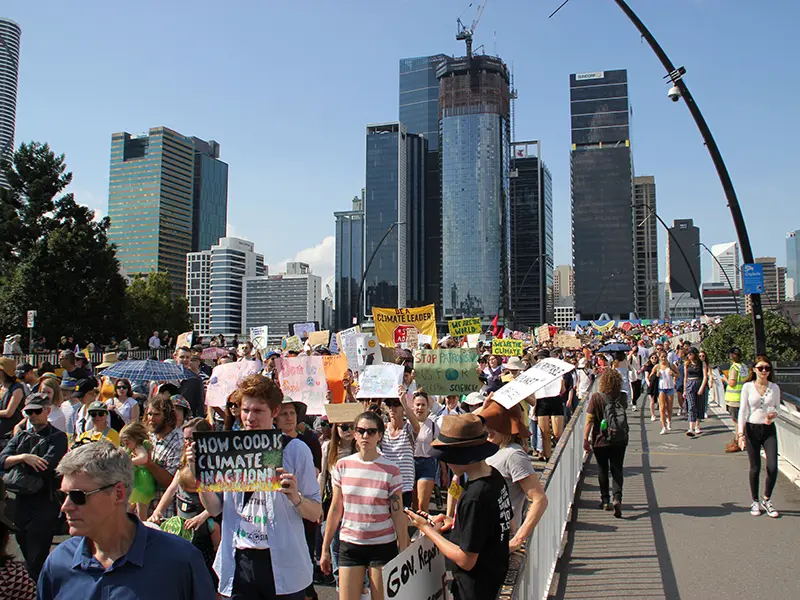What Is Climate Anxiety? | Seat At The Table
In part one of the latest Seat at the Table installments, Jack Harries is on a mission to discover why 60% of young people around the world suffer from Climate Anxiety and what we can do to help them. In this episode, he talks to leading psychotherapist and researcher Caroline Hickman, actor and UN environmental ambassador Aidan Gallagher, and the UK Secretary of State for Education, Nadhim Zahawi. His mission takes him to the Philippines to see first-hand how the climate crisis and climate anxiety are impacting the people that call it home.
All carbon emissions created in making this episode have been offset twice.
0.06 Introduction
1.29 What is Climate Anxiety?
2.37 Meeting psychotherapist, Caroline Hickman
4.28 Speaking to Force of Nature’s founder Clover Hogan
06.55 Meeting Nadhim Zahawi, the UK’s Secretary of State for Education
10.08 Visiting a Welsh school to hear the students’ views on climate anxiety
14.15 The climate change impact in the Philippines
20.04 The climate anxiety divide
21.44 Speaking to actor and UN environmental ambassador, Aidan Gallagher
Climate Anxiety in Young People: A Call to Action
Climate change poses a major threat to human health. Emerging studies are elucidating the physical health effects of climate change, such as increased rates of heat-related illnesses and infectious diseases and exacerbation of cardiopulmonary conditions; however, research is scarce on the psychological effects, particularly in young people (defined by WHO as individuals aged 10–24 years) and youth (15–24 years) who might be disproportionately affected. The climate crisis could precipitate new psychological conditions and worsen existing mental illnesses among young people experiencing climate anxiety, yet pervasive data gaps preclude our ability to act.
Natural disasters precipitated by climate change including hurricanes, heatwaves, wildfires, and floods can lead to direct psychological effects, such as increased rates of depression, anxiety, post-traumatic stress, and other mental health disorders. However, psychological effects of climate change unrelated to a climate event are less well characterised. Referred to as eco-anxiety, climate distress, climate change anxiety, or climate anxiety, these terms describe anxiety related to the global climate crisis and the threat of environmental disaster. Symptoms associated with climate anxiety include panic attacks, insomnia, and obsessive thinking.
Feelings of climate distress might also compound other daily stressors to negatively affect overall mental health, potentially leading to increases in stress-related problems such as substance use disorders, anxiety disorders, and depression. With little available data, the prevalence of climate anxiety cannot be quantified, although there are indications that young people are adversely affected.
For instance, global youth-led climate strikes, federal lawsuits demanding government action to reduce greenhouse gas emissions, and advocacy by young climate activists such as Greta Thunberg and Isra Hirsi show that youth are anxious about their collective futures. In 2019, in March alone, an estimated 1·6 million school-aged protestors in 125 countries demanded action be taken to combat climate change. Direct effects of the climate crisis on youth are already apparent: the global concentration of atmospheric carbon dioxide is the highest it has been in 3 million years, sea levels are continuously rising, and global temperatures are the hottest ever recorded. To compensate, the lifetime carbon dioxide emissions (or carbon budget) of the average young person today will need to be eight times less than that of their grandparents to restrict global warming to 1·5°C, as the limit set out by the Intergovernmental Panel on Climate Change in 2018.
Youth might be more likely than adults to experience ill-effects associated with climate anxiety. They are at a crucial point in their physical and psychological development, when enhanced vulnerability to the effects of stress and everyday anxiety elevate their risk of developing depression, anxiety, and substance use disorders. Additionally, chronic stress during youth might result in permanent alterations in brain structure and the emergence of psychopathologies later in life.
As such, the stress of a climate crisis during a crucial developmental period, coupled with an increased likelihood of encountering repeated stressors related to climate change throughout life, will conceivably increase the incidence of mental illness over the life course. However, few attempts have been made to investigate the short-term and long-term effects of climate anxiety on the mental health of youth.
Measuring the magnitude of the effects of climate anxiety on youth mental health, identifying which groups are most affected, and partnering with youth to develop approaches to mitigate the mental health effects is a pressing priority. Valid and reliable tools for measuring climate anxiety should be developed and implemented, and standardisation in the field promoted to enable comparisons among and within populations.
Few tools have been published in peer-reviewed research and, concerningly, even fewer measure climate anxiety in young people. Of the studies in youth, many do not focus specifically on climate anxiety and its effects on mental health, but instead investigate alternative outcomes such as the relationship between climate concern and environmental actions. Thus, the development of climate anxiety scales (like in the 2020 publication by Clayton and Karazsia) and validation in diverse youth populations might be a first step in addressing this knowledge gap, followed by prospective studies in young people to improve understanding of the long-term effects on mental health.
Mental health professionals, policy makers, and advocates need robust evidence to mitigate the effects of climate anxiety and stress on the short-term and long-term mental health of young people. There has never been such a large population of young people globally, nor do we anticipate any reversal of the impacts of climate change. Young people are agents of change, our future leaders, and most likely to succeed in improving planetary health. Thus, making investments to improve their mental health and wellbeing will provide dividends now and in the future.

Source
Image Credit: Stephen Hass, Wikimedia Commons, Stephen Hass, Wikimedia Commons
Tags: What Is Climate Anxiety?

